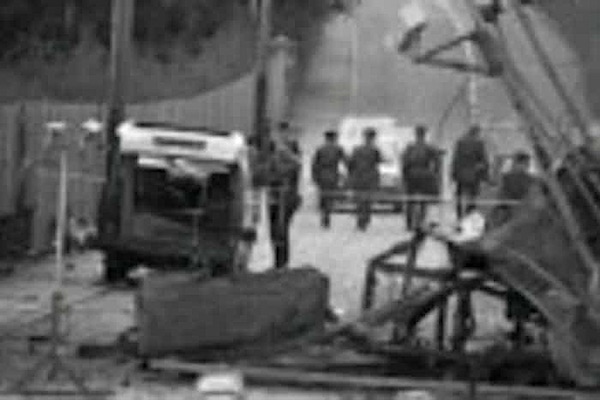
A High Court judge has found that the leader of the Democratic Unionist Party, Arlene Foster, illegally blocked funding for inquests into killings in the north of Ireland.
The ruling is the latest embarrassment for the former first minister, following her party’s decision to collapse the northern talks process over moves to recognise the Irish language.
Ruling on a legal challenge, the judge said the former First Minister was wrong to think she could delay the decision on inquest funds until after a future political agreement.
The judge said the obligation to investigate deaths during the conflict remained whether or not the powersharing administration was restored in Belfast.
The legal challenge was brought by Brigid Hughes, the widow of Anthony Hughes, an innocent civilian shot dead in 1987 in the Loughgall massacre of eight IRA Volunteers in County Armagh (pictured).
Mrs Hughes said she was pleased with the outcome of the hearing but said it had “taken a very long time.” More than 50 inquests from the conflict remain outstanding, with potentially 72 more cases in the pipeline.
The judge, Paul Girvan, found that a “systemic delay” in dealing with state killings had undermined the human rights of the Hughes family. He urged the authorities in London and Stormont to provide extra funding for hearings into nearly 100 deaths without waiting for a political agreement.
Although the 2014 Stormont House Agreement includes a package to deal with all legacy issues, the funds were never released. The British government had said full political consensus must first be reached on dealing with the past.
The head of the judiciary in the Six Counties, Declan Morgan, had advanced a plan for having all cases dealt with within five years.
Judge Girvan noted that Foster ‘did not make any conscientious effort to seek agreement as to what should be done’, adding that she had a responsibility to discuss and try and agree the matter with the late Sinn Fein Deputy First Minister, Martin McGuinness.
Instead, Foster had concentrated on what she wanted to achieve politically, linking the resolution of outstanding inquests to the establishment of other legacy mechanisms. She noted her decision favoured members of the British state forces involved in the killings, as well as “victims who were not innocent”.
Sinn Fein’s Michelle O’Neill said she welcomed the judgement, and that British Direct Ruler Karen Bradley should release the funding for inquests immediately.
“It vindicates the long campaign by victims and survivors waiting decades for Inquests into their loved ones deaths,” she said.
The SDLP legacy spokesperson Dolores Kelly MLA welcomed the judgment saying it “confirmed what many of us have believed for some time”.
“We have called for both governments jointly to agree a package of legislation, including on the establishment of legacy bodies and the release of inquest funding.”
Last month, Ms Foster backed away from a deal in talks would have seen the British government finally grant funding for legacy inquests. She subsequently said it would be “astonishing” if the funding was released without an overall agreement. Meanwhile her party has been separately pursuing an amnesty for the British Army through the Westminster parliament.
Sinn Fein’s Michelle O’Neill said she welcomed the judgement, and that British Direct Ruler Karen Bradley should release the funding for inquests immediately.
“It vindicates the long campaign by victims and survivors waiting decades for Inquests into their loved ones deaths,” she said.
“The British government should never have been using victims as bargaining chips in the negotiations and they now need to implement their agreement, release the funds immediately and start the consultation.”
![[Irish Republican News]](https://republican-news.org/graphics/title_gifs/rn.gif)
![[Irish Republican News]](https://republican-news.org/graphics/title_gifs/harp.gif)

